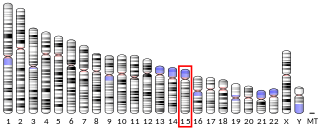Related Research Articles

Vesicular monoamine transporter 1 (VMAT1) also known as chromaffin granule amine transporter (CGAT) or solute carrier family 18 member 1 (SLC18A1) is a protein that in humans is encoded by the SLC18A1 gene. VMAT1 is an integral membrane protein, which is embedded in synaptic vesicles and serves to transfer monoamines, such as norepinephrine, epinephrine, dopamine, and serotonin, between the cytosol and synaptic vesicles. SLC18A1 is an isoform of the vesicular monoamine transporter.
The solute carrier (SLC) group of membrane transport proteins include over 400 members organized into 65 families. Most members of the SLC group are located in the cell membrane. The SLC gene nomenclature system was originally proposed by the HUGO Gene Nomenclature Committee (HGNC) and is the basis for the official HGNC names of the genes that encode these transporters. A more general transmembrane transporter classification can be found in TCDB database.
CD98 is a glycoprotein that is a heterodimer composed of SLC3A2 and SLC7A5 that forms the large neutral amino acid transporter (LAT1). LAT1 is a heterodimeric membrane transport protein that preferentially transports branched-chain and aromatic amino acids. LAT is highly expressed in brain capillaries relative to other tissues.

Equilibrative nucleoside transporter 1 (ENT1) is a protein that in humans is encoded by the SLC29A1 gene. Multiple alternatively spliced variants, encoding the same protein, have been found for this gene.

Equilibrative nucleoside transporter 2 (ENT2) is a protein that in humans is encoded by the SLC29A2 gene.

Concentrative nucleoside transporter 2 (CNT2) is a protein that in humans is encoded by the SLC28A2 gene.

Concentrative nucleoside transporter 1 (CNT1) is a protein that in humans is encoded by the SLC28A1 gene.
An amino acid transporter is a membrane transport protein that transports amino acids. They are mainly of the solute carrier family.

An adenosine reuptake inhibitor (AdoRI) is a type of drug which acts as a reuptake inhibitor for the purine nucleoside and neurotransmitter adenosine by blocking the action of one or more of the equilibrative nucleoside transporters (ENTs). This in turn leads to increased extracellular concentrations of adenosine and therefore an increase in adenosinergic neurotransmission.

The plasma membrane monoamine transporter (PMAT) is a low-affinity monoamine transporter protein which in humans is encoded by the SLC29A4 gene. It is known alternatively as the human equilibrative nucleoside transporter-4 (hENT4). Unlike other members of the ENT family, it is impermeable to most nucleosides, with the exception of the inhibitory neurotransmitter and ribonucleoside adenosine, which it is permeable to in a highly pH-dependent manner.

Nucleoside transporters (NTs) are a group of membrane transport proteins which transport nucleoside substrates like adenosine across the membranes of cells and/or vesicles. There are two known types of nucleoside transporters, concentrative nucleoside transporters and equilibrative nucleoside transporters, as well as possibly a yet-unidentified vesicular transporter.

Zinc transporter ZIP10, also known as solute carrier family 39 member 10, is a protein that in humans is encoded by the SLC39A10 gene. ZIP10 belongs to a subfamily of proteins that show structural characteristics of zinc transporters, and have 14 members in the human genome: ZIP1, ZIP2, ZIP3, ZIP4, ZIP5, ZIP6, ZIP7, ZIP8, ZIP9, ZIP10, ZIP11, ZIP12, ZIP13 and ZIP14.

Monocarboxylate transporter 10, also known as aromatic amino acid transporter 1 and T-type amino acid transporter 1 (TAT1) and solute carrier family 16 member 10 (SLC16A10), is a protein that in humans is encoded by the SLC16A10 gene. SLC16A10 is a member of the solute carrier family.

Solute carrier organic anion transporter family member 2A1, also known as the prostaglandin transporter (PGT), is a protein that in humans is encoded by the SLCO2A1 gene.
Human concentrative nucleoside transporters include SLC28A1, SLC28A2 and SLC28A3 proteins. SLC28A2 is a purine-specific Na+-nucleoside cotransporter localised to the bile canalicular membrane. SLC28A1 is a Na+-dependent nucleoside transporter selective for pyrimidine nucleosides and adenosine. It also transports the anti-viral nucleoside analogues Zidovudine and Zalcitabine.

Acetyl-coenzyme A transporter 1 also known as solute carrier family 33 member 1 (SLC33A1) is a protein that in humans is encoded by the SLC33A1 gene.

Glucose-6-phosphate exchanger SLC37A2 is a protein that in humans is encoded by the SLC37A2 gene.

Monocarboxylate transporter 3 (MCT3) also known as solute carrier family 16 member 8 is a protein that in humans is encoded by the SLC16A8 gene. MCT is a proton-coupled monocarboxylate transporter. It catalyzes the rapid transport across the plasma membrane of many monocarboxylates such as lactate, pyruvate, branched-chain oxo acids derived from leucine, valine and isoleucine, and the ketone bodies acetoacetate, beta-hydroxybutyrate and acetate. It also functions as high-affinity pyruvate transporter.
Members of the Equilibrative Nucleoside Transporter (ENT) Family are transport proteins that are specific to nucleosides and nucleobases, and are part of the major facilitator superfamily. They generally possess at least 6, typically 10, transmembrane segments (TMSs) and are 300-600 amino acyl residues in length.

Glucose-6-phosphate exchanger SLC37A1 is a protein that in humans is encoded by the SLC37A1 gene. SLC37A1 locates to the membrane of the endoplasmic reticulum (ER), and is a glucose 6-phosphate:inorganic phosphate antiporter, transporting glucose 6-phosphate from the cytoplasm into the lumen of the ER, while transporting phosphate in the opposite direction.
References
- 1 2 Baldwin SA, Beal PR, Yao SY, King AE, Cass CE, Young JD (Feb 2004). "The equilibrative nucleoside transporter family, SLC29". Pflügers Archiv. 447 (5): 735–43. doi:10.1007/s00424-003-1103-2. PMID 12838422.
- 1 2 Molina-Arcas M, Casado FJ, Pastor-Anglada M (Oct 2009). "Nucleoside transporter proteins". Current Vascular Pharmacology. 7 (4): 426–34. doi:10.2174/157016109789043892. PMID 19485885. Archived from the original on 2013-01-13.
- ↑ Noji T, Karasawa A, Kusaka H (Jul 2004). "Adenosine uptake inhibitors". European Journal of Pharmacology. 495 (1): 1–16. doi:10.1016/j.ejphar.2004.05.003. PMID 15219815.